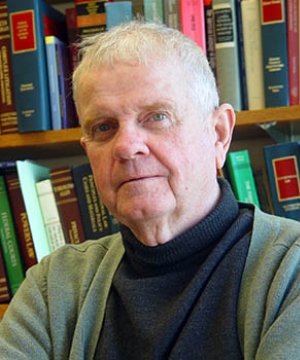Henry P. Monaghan to Be Honored for Body of Scholarship on Federal Courts
AALS names Professor Henry Monaghan a recipient of its inaugural Daniel J. Meltzer Award for his contributions in the field of federal courts.
Henry Paul Monaghan, the Harlan Fiske Stone Professor of Constitutional Law at Columbia Law School and one of the nation’s leading scholars of the federal courts, has been selected as a co-recipient of the inaugural Daniel J. Meltzer Award by the Federal Courts Section of the Association of American Law Schools (AALS). The award, to be given no more frequently than every three years, honors the life and work of Daniel J. Meltzer, the Story Professor of Law at Harvard Law School whose premature death in 2015 saddened the law school community.
The selection committee was comprised of Curtis Bradley, a professor of law at Duke; Judith Resnik, professor of law at Yale; Amanda Tylor, a professor of law at Berkeley; and Ernest Young, a professor of law at Duke.
Monaghan’s teaching, scholarship and mentorship have advanced the field of federal courts and enriched the lives of his students and colleagues, said Gillian Lester, Dean and Lucy G. Moses Professor of Law at Columbia.
“Henry is a force in the field of federal courts and at the Law School, where his insights and guidance have deepened our understanding of the law and our connections with one another,” said Lester. “I am grateful for Henry’s contributions to our community and for the ability to call him a colleague.”
Scholar and convener
Monaghan joined CLS in 1984, making him one of the Law School’s longest serving faculty members. He is the author of a series of landmark articles in both constitutional law and federal courts, including in the Columbia Law Review: “Marbury and the Administrative State” (1983), “Stare Decisis and Constitutional Adjudication” (1988), “The Protective Power of the Presidency” (1993), and “On Avoiding Avoidance, Agenda Control, and Related Matters” (2012). Carolina Academic Press is scheduled to publish a collection of many of his major works later this month.
In a widely noticed Foreword to a review of the Supreme Court’s 1974 term published by the Harvard Law Review in 1975, Monaghan argued that some of “constitutional” decisions of the Supreme Court are best understood as “constitutional common law,” and thus subject to some congressional revision.
“Like Dan, Henry is one of the lions of the federal courts,” said Gillian Metzger ’96, the Stanley H. Fuld Professor of Law at Columbia and a former student of Monaghan’s. “His exceptional analytic powers have illuminated — and as frequently reshaped — too many complex puzzles in the field for anyone to count.”
“Long ago, when I was a student in his federal courts class, I decided that the best way to understand the subject was to read through the Monaghan aegis, and that technique still works to this day,” she added.
Among other contributions, Monaghan established a series of annual workshops on public law at which faculty and scholars who are visiting the Law School gather weekly throughout the summer to discuss and debate legal issues and judicial rulings.
The latest series of workshops, now entering their 20th year, included discussions of trademarks and the First Amendment, and the Supreme Court’s review of partisan gerrymandering.
“I look for two things: good performers and interesting cases,” Monaghan said in June. “You’re talking about something real where people are engaged. All the people who come are really quite intellectually curious. Even if the topic is not up their alley, they’d still be interested in walking into the alley to see what’s there.”
Championing colleagues
The award marks the latest in a series of accolades for Monaghan, who was honored in 2015 by colleagues at the Tenth Annual John F. Scarpa Conference on Law, Politics and Culture held in at Villanova University School of Law. In 2010, he was awarded the Medal for Excellence from Columbia Law School.
In 2009, professors from Columbia, Yale, and Harvard Law schools honored Monaghan at a symposium titled “The View from the Curmudgeon’s Lair” that included two panel discussions: one that examined cases involving post-9/11 detainees and a second that revisited constitutional common law.
Monaghan has long championed his colleagues, especially those at the start of their careers. “We have been enormously successful in recruiting younger faculty, each one of whom is very special, and each of whom contributes to the life of the law school,” he said at a 2010 reception to honor the Medal of Excellence winners.
For his part, Monaghan termed “a wonderful situation” the opportunity to teach at the Law School. “I love the school; I go to the office every day, and I have always loved that experience,” he added.
Monaghan graduated from the Holyoke Community College and then from the University of Massachusetts. His law degree is from Yale Law School, and he holds a master’s in law from Harvard. He is a member of the American Academy of Arts & Sciences.
###
Related reading
Faculty Dissect and Discuss Trump Public Law Cases in Summer Workshop Series
Legal Scholars Honor Professor Henry Paul Monaghan
Attorney General Eric Holder '76, Professor Henry Monaghan Receive Law School’s Medal for Excellence
Posted on Dec. 20, 2017
